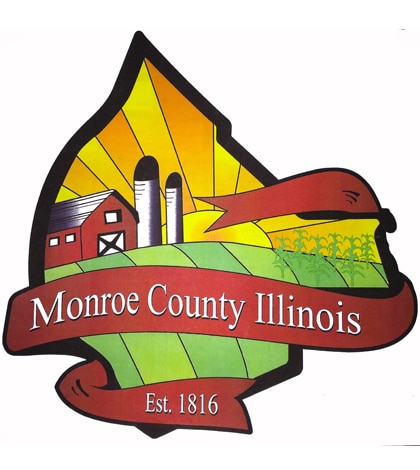Monroe County sends message as state modifies reopening plans

The Monroe County Board of Commissioners adopted a resolution at its meeting on Monday “asking for relief from Illinois Gov. JB Pritzker’s Restore Illinois plan.”
“The Monroe County Board of Commissioners feel that our combined goals are to continue to use best practices to maintain the health and well-being of the citizens of this county and our municipalities, while also making the necessary provisions to allow our businesses to reopen to provide jobs for our residents and products and services for those seeking to support our Monroe County businesses,” the resolution states.
The resolution does not compel or allow any action. It is meant to send a message to Pritzker.
“The governor has recently indicated that he would be willing to consider proposals, and Monroe County wanted to make sure that we sent something from our local elected officials setting out our position,” Monroe County State’s Attorney Chris Hitzemann said.
Hitzemann said he does not expect Monroe County to face any penalties because the resolution “does not take any stance on defiance” of Pritzker’s order.
The county sent the resolution to state Rep. Nathan Reitz (D-Steeleville) and state Sen. Paul Schimpf (R-Waterloo).
“We are hoping that our elected representatives will get together this week and come up with a more workable solution,” Hitzemann said.
Specifically, the resolution requests Pritzker allow Monroe County to move to the next phase of the reopening plan when it meets the benchmarks – not when the region as a whole does.
The Monroe County Health Department would monitor those guidelines and protocols. It is “positioned and ready to assist” on that front, the resolution states.
Any business that did not follow proper guidelines, such as wearing face masks and practicing social distancing, could have its license suspended, according to the resolution.
The county board took this action because it believes the measures put in place to slow the spread of the novel coronavirus – like many businesses being closed and non-essential travel being prohibited – have hurt the community.
“All of the above-listed actions have caused many businesses to close their doors with the harsh reality that many of them will never reopen, causing undue hardship to the owners and employees of those businesses and a loss of products and services to local communities,” the resolution states. “(The) actions have caused many residents to lose their jobs, forcing them to collect unemployment.”
The board also argued that the original intent of the stay at home order was to control the spread of the virus to ensure the hospital system is not overwhelmed and proper equipment acquired, and that goal has been met.
Similarly, the board said southern Illinois has seen less of an impact than large metropolitan areas.
“We feel that returning to work and reinforcing temporary safeguards for the business community is important and should be a priority for local and state government,” the board wrote in the resolution. “We understand the importance of continuing to practice social distancing, frequent hand washing, avoiding contact with your face and avoiding contact with items in public whenever possible….Residents should monitor their own health and remain home if feeling ill or having a temperature or a persistent cough.”
Randolph County approved a similar resolution this week, though it was limited to calling on Pritzker to allow a select few of the largest employers in that county to reopen with precautions in place.
At Monday’s meeting, Monroe County Health Department Administrator John Wagner said COVID-19 is not the only cause of illness and death in these times. In fact, he said, people fearing the virus and not going to doctors are experiencing additional issues. Waiting to get such tests as mammograms and colonoscopies may allow ailments that might be caught earlier to advance undetected, causing greater problems and even death.
He also noted that people staying at home are being involved in depression, family violence and greater substance abuse than seen in the recent past.
He supported reopening less population dense areas, such as southern Illinois, earlier than areas around Chicago.
“What the governor is doing is not good for southern Illinois, including Monroe County,” he said, adding, “Good for Chicago is not necessarily good for the rest of the state.”
He did not call for simply stopping measures to limit the virus spread, saying such steps as frequent cleaning, wearing masks in closer situations and avoiding close contact were worthy of being included.
“I don’t want simply to throw doors open,” he said.
Instead, he said the health department is ready to help businesses reopen safely.
Commissioner Dennis Knobloch said he felt it was time for politics to be removed from this discussion and that people should seek the best solutions on a nonpartisan basis. He called on citizens to contact their elected state representatives to express concerns and desires for their county, its citizens and businesses.
This move came just days before two major developments at the state level.
First, Pritzker withdrew his emergency rule that would have made it a Class A misdemeanor for businesses to violate the state’s orders. Lawmakers across the state, especially Republicans, had been pressuring Pritzker to make this move.
Second, Pritzker announced modifications to phase three of his regional reopening plans. Bars and restaurants will be allowed to have outdoor dine-in service, provided that tables are six feet apart and not near the sidewalk and other guidance like staff wearing masks are followed.
Camping and boating in groups of 10 or fewer people will also be permitted, as will golf in foursomes with one person or one household to a cart. The state will be supplying guidance for places like driving ranges and outdoor shooting ranges to reopen in the third phase.
Every region in Illinois is expected to move to phase three on May 29. The phase also allows for manufacturing businesses to reopen, retail stores to allow customers in with strict guidelines in place, child care centers and summer programs to operate under Illinois Department of Public Health guidance, health and fitness to provide one-on-one training inside or outdoor classes of up to 10 people and businesses like barbershops, salons and tattoo parlors to reopen with safety guidelines in place.
93 cases in county
Monroe County has seen just 10 new cases of COVID-19 since last Tuesday.
There are now 93 cases of coronavirus in Monroe County, while the death toll remains at 11.
Three new positive tests were reported by the Monroe County Health Department this past Friday, all three from the same household. A new case on Sunday involved the family member of a known positive. Two cases were announced Thursday, one stemming from an earlier outbreak at Garden Place Senior Living in Columbia and the other from the general public.
Oak Hill Senior Living and Rehabilitation Center in Waterloo did not report any new cases or deaths over the past week.
According to the Illinois Department of Public Health, there are 41 confirmed cases of the virus in the Columbia zip code (153 tests performed), 45 in the Waterloo zip code (245 tests performed) and seven in the Valmeyer zip code (27 tests performed).
The total amount of tests performed on Monroe County residents through private labs and in Missouri, however, is not known.
Countywide, 33 people have recovered from the virus and are released from quarantine in Monroe County, Wagner said.
Eight people are hospitalized with COVID-19.
To the north in St. Clair County, there are 1,117 confirmed cases, including 83 coronavirus-related deaths. A total of 6,330 people have been tested in that county.
Randolph County now has 264 confirmed cases, 42 of which are active. Three people have died from the virus, 219 have recovered and three are hospitalized with it in that county.
Across the southern region, all numbers are trending for the region to move to the next phase of Pritzker’s Restore Illinois plan at the end of this month. For full details of Restore Illinois, click here.
The same is true for every other region in the state.
The southern region has seen a 2.7 percent positivity rate, 2 percent decrease in positivity rate and 16.5 percent decrease in hospital admission with COVID-19-like symptoms in the last two weeks or since May 1.
The region also has 48.6 percent medical and surgical bed availability, 49.6 percent ICU bed availability and 75.5 percent ventilator availability.
No regional data is available on testing or contact tracing, two key metrics that help determine when a region can move to the next phase of Pritzker’s reopening plan.
But the state is now testing an average of more than 20,000 people per day and Pritzker announced a pilot program called the Illinois Contact Tracing Collaborative that takes a locally-driven approach to scale up contact tracing in the state.
St. Clair County is one of two counties where the initiative will begin.
Statewide, there are 113,195 cases of coronavirus and 4,923 deaths, according to the Illinois Department of Public Health.
The IDPH reported 1,178 additional cases and 39 additional deaths on Tuesday. It announced 1,713 more cases and 31 more deaths on Monday. It announced 2,508 new cases and 67 new deaths on Sunday. It announced 2,352 additional cases and 75 additional deaths on Saturday. It announced 2,758 more cases and 110 more deaths on Friday. It announced 2,268 new cases and 87 new deaths on Thursday.
In Missouri, there were 12,291 confirmed cases and 686 deaths as of Tuesday. That includes 4,583 cases in St. Louis County and 1,748 cases in St. Louis City, according to the Missouri Department of Health & Senior Services.
Nationally, more than 1,679,945 people had contracted the virus as of Tuesday afternoon, while 98,606 people have died from it.
The pandemic has now spread to at least 177 countries, with over 5.5 million cases and at least 347,509 deaths worldwide.
The Centers for Disease Control and Prevention has released guidelines on how to safely reopen the country from restrictions placed as part of the coronavirus pandemic.






